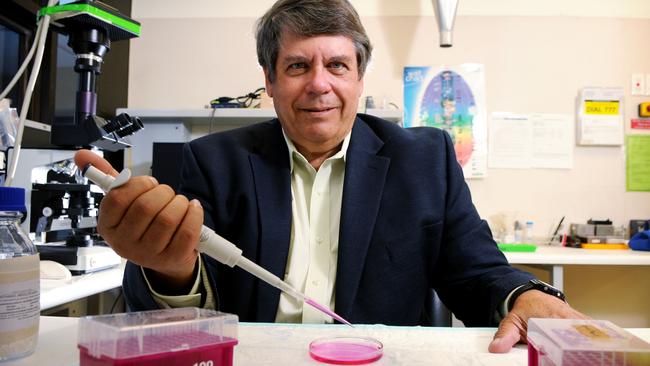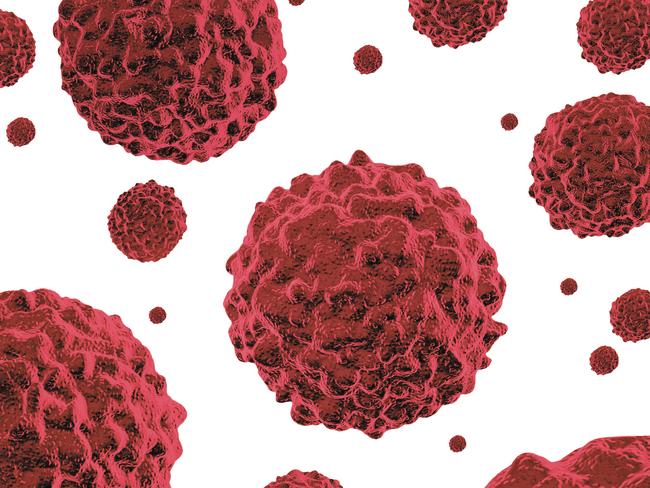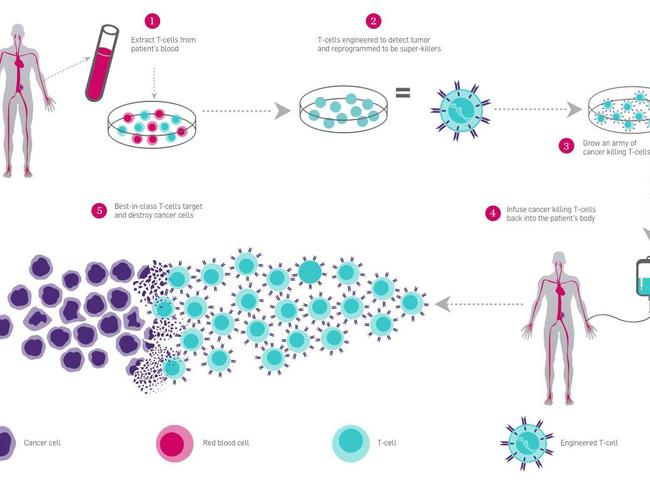Cancer-killing CAR T-cell immunotherapy to become more accessible to patients
CANCER patients would have access to an off-the-shelf immunotherapies to reprogram their immune system as part of a world-first plan to turn experimental treatments into ready-made products.

VIC News
Don't miss out on the headlines from VIC News. Followed categories will be added to My News.
CANCER patients would have access to an off-the-shelf immunotherapies to reprogram their immune system to fight tumours at a fraction of the current price, as part of a world-first plan to turn these experimental treatments into ready-made products.
CAR T-cell therapy involves removing a patient’s immune cells, re-engineering them and infusing them back to create a “designer” immune system, usually as a last-ditch attempt to save their life.
While still experimental, it has been able to “melt” cancer away in some blood cancer patients after just months.
LITTLE FIGHTERS BATTLE SERIOUS ILLNESS AT RCH
BRAIN CANCER TREATMENTS COULD BENEFIT FROM DISCOVERY
OVARIAN CANCER AND ASTHMA THERAPY FAST-TRACKED

With only a couple of clinical trials being run across the country, Australians must travel to the US and spent about $500,000 for this high-risk treatment; a price and time delay many seriously ill patients cannot afford.
But a Melbourne consortium of leading stem cell scientists, backed by a $3 million Federal Government grant and almost $10 million from private backers, is using a rare type of cell from healthy donors to turn into cancer-fighting immune cells.
The partnership between Melbourne biotech company Cartherics, Hudson Institute of Medical Research, Monash University, Mesoblast and Cell Therapies, plan to start testing their treatments in patients with relapsed ovarian and gastric cancers from next year.

Cartherics chief Professor Alan Trounson, IVF pioneer and former president of the renowned California Institute for Regenerative Medicine, said theirs was a unique method of using a rare cell found in cord blood banks and bone marrow registries, converting this into induced pluripotent stem cells to become cancer-killing cells.
“There are very few companies looking at this yet, and none of them using the same kind of cells we are,” Prof Trounson said.
“We know we already have an extremely effective therapy in animals. Now we need to develop the off-the-shelf component before we can start clinical trials.”

He said CAR T cell immunotherapy was becoming closer to becoming standard treatment alongside chemotherapy, radiation and surgery.
“Instead of the costly procedure of taking the patient’s own immune cells, engineering them and putting them back, this is going to be much cheaper — probably saving up to 80 per cent of the cost.
“From a healthy donor we’d be able to make treatments for hundreds, if not thousands of patients and that radically changes the ability for access for cancer patients.
“I think this will eventually become the dominant type of cancer treatment.”


